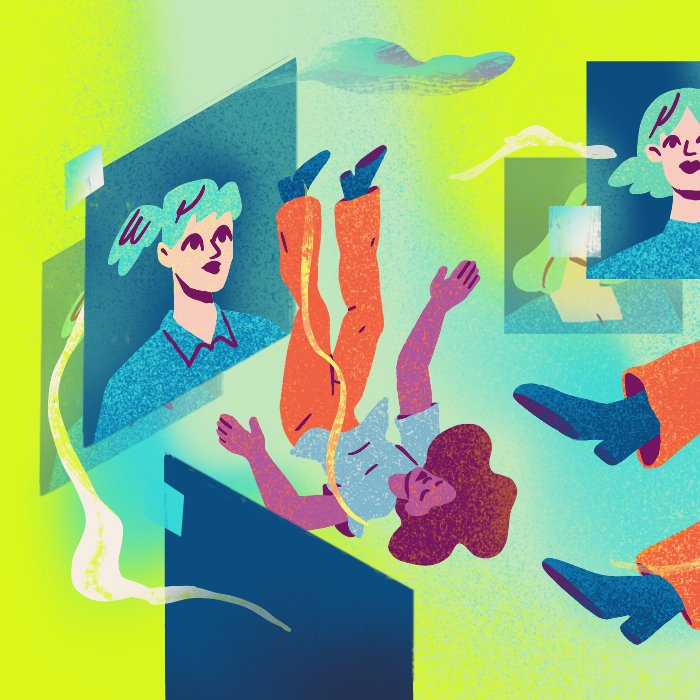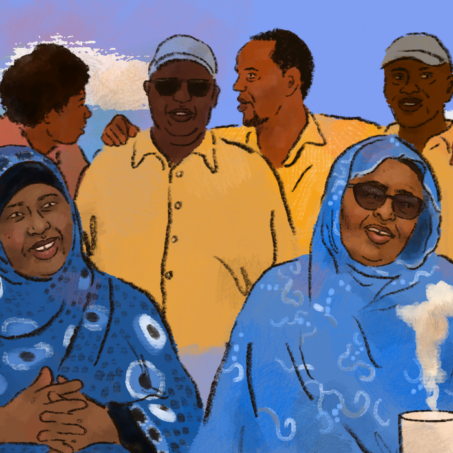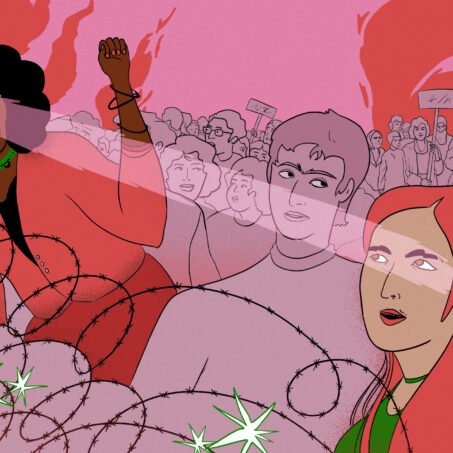As an unenthusiastic but habitual and semi-successful Hinge user, I think it’s very important to keep it light. “Dating apps are fun if you treat them like a game on your phone,” I often coo to newly single friends.
What I mean by this: have a scroll when you’re on the loo or waiting for a bus, never get invested, don’t take it too seriously – these people don’t exist until you meet them.
Yet, I’ve become increasingly aware of how this personal gamification has affected my romantic relationships. The problem: I’m keeping it too light.
People feel more disposable. I don’t think twice before ghosting. The dopamine rush of likes and roses just doesn’t hit the same. Dating apps feel more like a chore than they did when I first became single three years ago, and yet I have no idea how to date without them.
“It’s impossible to imagine what a relationship would be like without technology now,” says Alfie Brown, Lecturer in Digital Media Culture and Technology at Royal Holloway University. “Not just dating apps, but also apps like WhatsApp – people have long relationships where all they do is message all day. I’m definitely guilty of it too.”
We’re discussing Alfie’s latest book, Dream Lovers: The Gamification of Relationships, which traverses the growing industries of love and sex technologies to expose the hidden connections between corporations, the state and desire.
Truly, it provided the analysis I have been craving: a deep dive into something I feel in my bones (dating apps are cursed) by uncovering how these apps are part of a much larger shift.
Hinge calls itself ‘the app that’s designed to be deleted’, but as Alfie tells me, “they obviously don’t want you to delete the app. It’s counterintuitive to its own success. You’re on a conveyor belt of short-term partners.”
The promise of pleasure with built in disappointment
In Chapter two of Dream Lovers, Alfie writes how dating apps promise pleasure with built-in disappointment, describing the gap between how something is presented digitally to the real experience. This is an addictive, consistently inconsistent, gamified version of dating, and what my favourite podcasters (Binchtopia) described as “conditioning our little rat brains to keep coming back for more”.
Alfie explains, “This is something which I didn’t really put in the book: but I think there’s a bigger problem at play where as a society we’re really struggling to maintain relationships. This is partly to do with the apps because they encourage us to always be thinking about the next thing. We’ve lost the art of sustaining good relationships and sustaining desire and pleasure within the structure of good relationships. And instead, we’re shifting to a commodity version of moving onto the next thing as soon as the first thing starts to not function as well.”
But, I reckon it’s worse than this. People jump ship when they don’t get a text back within 30 minutes.
I’m reminded of Annie Lord’s column on using Hinge to date two men at once to “spread out the crazy” and “appear more nonchalant to the guy you actually like”. I’ve totally done this, and advised friends to do the same. And this preemptive exit strategy is ultimately a way to prevent being hurt.
It stops us committing the sin of all sins – being emotionally invested(!) in someone ‘too early’ in a society plagued by relationship short-termism and hook-up culture (cough, cough patriarchy).
I wonder about Alfie’s experiences with dating apps, and the many other forms of technology he explores in the book.
Alfie explains this journey for him started when he separated from his ex-wife and decided to see if he could replace her with a robot. “I thought it would be interesting,” he laughs. “I went in half joking and half with a genuinely open mind to explore the extent to which technology is able to replicate human relationships. I was aware of everything from sex tech to virtual reality pornography to relationship simulators, AI chatbots…. all of which claim to replace the function of a human.”
It was the pursuit of this question, asking it honestly without a predetermined answer, which ended up being a much longer project for Alfie, culminating in his recent release.
Desirevolution
Dream Lovers posits my increasing dissatisfaction with dating, alongside with the explosion of sex and love tech, are because humanity is experiencing a ‘desirevolution’.
A desirevolution is defined by Alfie as being “a fundamental and political transformation of the way we desire as human beings.” He explains that the last known revolution was the in the 1960s, which was rooted in liberating desire.
Dream Lovers makes the case that technology is now the central force in organising human desire, ultimately changing how humans love each other. “We love to think of our desires as our own, but actually, our desires are precisely the site where we’re being influenced by other forces,” states Alfie.
It’s hard to comprehend that who I fancy, let alone love, is being influenced by our Silicon Valley overlords. Those feelings are so real, random and intense: how can they be curated when I can’t even predict it?

Join our mailing list
Sign up for shado's picks of the week! Dropping in your inbox every Friday, we share news from inside shado + out, plus job listings, event recommendations and actions ✊
Sign up for shado's picks of the week! Dropping in your inbox every Friday, we share news from inside shado + out, plus job listings, event recommendations and actions ✊
This is exactly what Alfie is asking us to critically interrogate: the popular understanding that love is some wild, irrefutable force that exists outside of our political and economic systems.
Throughout the ages, different social forces have influenced how we do love and relationships. Whether it’s the church, the state, literature or film, Alfie writes how “desires have always been shaped and reconstructed by our institutions and the situation today is no different.”
While I’m less aware of how technology might be directly influencing me, I’m very aware of how films and TV have conditioned my generation’s understanding of love and romance.
We are able to see and resist the gender norms laid out for us in our favourite early 2000s sitcoms. My friends and I often joke that you can tell when a man is inexperienced in a relationship as he’ll just copy random lines from rom-coms that make zero sense. He’s saying what he feels he’s supposed to say, rather than what he actually feels.
So, if love is always being influenced by external forces, why is technology different? What makes this particular shift a desirevolution?
Ultimately, as Alfie explains, this is because technology isn’t just influencing desire, it’s completely transforming it. “Tech companies claim to be giving the subjects what they want, but are instead geared towards deploying tech which transforms what we want. They’re reordering our desires to suit their agendas.”
The splinternet
An early example in Dream Lovers looks at how Tinder is an ally to hyper-productive capitalism.
As a platform, Tinder serves to streamline dating to be as time-minimal and short-lived as possible, easily slotting into a 9-5 work week with negligible disruption. And simultaneously, it collects ‘intimate data’ which can be sold off to advertisers for a shit-ton of money. Intimate data is extremely valuable because it is very useful for predicting our desires (aka making us buy stuff).
Personally, Tinder is a bit scary to me; it moves too quickly. But it doesn’t matter whether I use it or not, because I do use Hinge. And they’re owned by the same conglomerate, IAC, which also owns OkCupid, PlentyofFish, Black People Meet and 40 other dating platforms, and therefore have all my data anyway.
In fact, they have a global monopoly on our intimate data. Alfie explains how “now the decisions of one company have a significant impact on the future of dating”, a force on a scale we’ve never seen before.
But we’ve heard this before, right? We know our data is being harvested by the platforms we use and sold to bad companies who do bad things with it.
It kind of feels unavoidable at this point, and as Alfie explains, “love is being assimilated into wider patterns of development.” These algorithms construct who we date, what we watch, what we eat, and new patterns of desire which ultimately benefit those already in power. And these algorithms have inherited the social biases of their creators.
“There are Trump dating sites, there is also a new one in development called OkComrade, which is like a leftist dating site. The logic of these clearly exposes how we are being organised into groups based on politics,” Alfie tells me. The Trump dating site serves three functions: 1) to match people with partners, 2) to boost Trump’s image and power and 3) to collect data which helps define this group and makes them easier to market to.
Another particularly terrifying example in Dream Lovers is Baihe, a Chinese dating app, which links up to a monitored social credit system which then curates who you can and can’t date. You lose points if your friends get arrested, for example, maintaining class divides. Alfie explains how many Chinese citizens work on improving their score, like a game with prizes, “which is a good example of harnessing desire to benefit current systems.”
Whether you’re using OkComrade, or just using signifiers on your Hinge profile to indicate your political leanings to potential partners, you’re still partaking in solidifying identity groups under platform capitalism.
Alfie calls this the ‘splinternet’, the ‘process by which digital space is organised and curated into distinct blocks with specific demographics.’
Around the 2019 UK election, I matched with someone who turned out to be a conservative. I knew I wouldn’t date him because he asked me if I was “one of those Corbyn supporters,” but I did barney with him all afternoon to try and bring him round (every vote counts darlings!).
He ended up calling me small minded because I wouldn’t go for a drink with him on account of his political opinions. But if I was small minded then, I’m even smaller minded now. I wouldn’t even bother replying; it takes up too much energy.
Alfie writes that “dating sites are specifically interested in organising the desireconomy into particular class-oriented patterns to set the blueprint for a capitalism to come… they generate corporate profit while also preventing the development of mass culture of solidarity and resistance.”
In this way, we’re all only dating people who agree with us, which hardens divides between communities.
And yet, I don’t want to date someone right-wing. I want to date someone with values aligned to mine. When it comes to other social media, sure, we should be more open-minded, debating and creating friends across political and economic spectrums. But is there an argument to there being some safety in the splinternet of love?
I think of how many women and marginalised folks, specifically disabled, trans or fat women, can use these signifiers to sense when they might be in danger or being fetishised before being in a physical space with someone scary. Maybe the echo-chamber can provide safety when it comes to intimate relationships – especially when dating strangers is already dangerous for so many.

Craving difference
“The logic of ‘matching’ is that you would like someone who’s just like you – and I don’t think that makes a lot of sense,” says Alfie. “This is a wild comparison – but look at categories on a porn website; you can see eroticism is often driven by experiences and people who are very different to you. Sex and desire are not driven by our motivation to find someone exactly like ourselves.”
I work in climate, and last year was messaging one of my ‘most compatible’ suggestions on Hinge – a guy who was doing his PhD in something climatey.
He looked fun and dressed nicely in his pics. I turned up to the pub and he was barefoot(?), kept asking me about my views on carbon pricing and barely restrained from rolling his eyes when I said I loved Beauty and the Geek.
I realised I much preferred dating people who have no clue about my job so I could talk about something else. Since then, I have sworn off dating people in the same sector as me, because it is boring.
So I guess what I want is difference, but also safety and respect? Surely this is possible?
“You’re supposed to think of the internet as this kind of shared commons, where you can meet anyone in a global, infinite network of people and things. But in reality, we’re so partitioned off per our politics, our identity types etcetera, by these algorithms that we never even see. And this changes our perspective on the world news media and so on,” explains Alfie.
It comes back to the knowledge that love and camaraderie between people does have the power to bridge divides. I have personally learnt or come to understand something from the majority of people I’ve dated. And I hope they would say the same about me (even if it is me just telling a man I’m on a date with he hasn’t asked me a single question in 45 minutes).
Living in such divided times, when we desperately need to build solidarity and understanding between communities, it’s frightening that these love technologies are working against this.
We’re not in a Dystopia… yet
While it seems hellish, Alfie does a brilliant job of not drifting towards technological dystopia – but simply asking what we can do with the conditions handed to us? He doesn’t identify these trends hopelessly, but ‘make them visible to plot towards changing them’.
I ask how, despite all the evidence, he remains hopeful. He replies: “We now know desire isn’t natural. It’s all mediated by culture and economic forces. But since we know it’s not innate, this is a positive realisation.”
“It’s charged with potential,” Alfie reassures me. “It’s giving you the power to think about what kind of love and desire you want to cultivate and create for the future. How would we want to construct this going forward?”
Potential is good and exciting. It feels like an uphill battle, but no bigger than the other things I am committed to. As I’ve said, I work in the climate space, and from this I know how important imagining new systems are in making change.
At the end of each chapter, Alfie offers prompts or ideas on how coders and programmers could take the technology and do it differently, challenging the status quo set by tech conglomerates and harnessing the technological power for a more socially just future.
“Ultimately, we aren’t going to solve problems by making apps – we probably need to overthrow capitalism,” he says casually. “But it’s good to see people playing around with these things and asking, could they do something progressive?”
Dating advice
I ask if he’s got any advice for the humble dating app users, as at this point I’m wondering whether it’s possible to ethically date using technologies in 2022.
Alfie laughs, “My view isn’t that these apps are so evil that we shouldn’t use them. I have tried all of these things for research but also with an open mind to developing a relationship.”
“So, you could date against the grain of these apps? You could set your parameters on things you don’t want, just to see what happens. Or you could maybe do it with your phone upside down. So that every time you swipe right, you actually swipe left,” he advises.
I’m not sure about this, there are weird men on dating apps who I avoid for a reason. But I do understand: it’s important to shake up the algorithm to meet people outside of your bubble.
“Maybe the answer is just being aware of the way in which these apps tend to organise people based on groups and types, and seeing if there’s anything you can do as a user to push yourself to go outside those boundaries? That would be a start,” he counters.
“When I went into those weird alt right online communities as part of the research for the book, I didn’t find them as scary as I thought,” explains Alfie. “People were still people. We need to have conversations with people that aren’t like us politically. The real problem is corporations and this black boxing of technology so you don’t know what algorithms are being used to match you up with people.”
Knowledge is power, and as I read Dream Lovers, so much resonated with what I had experienced – it put my dating life into a much broader context. And Alfie’s curiosity and genuine enthusiasm for the crazy technological developments we are seeing is infectious.
He genuinely is excited at the potential that we have at our fingertips. To him, tech isn’t a death warrant on relationships, we are simply in a time of transformation – and just like any area of our lives, it requires us to be critical of the things we take for granted. Dream Lovers explicitly lays out how we are being manipulated to serve corporate interests, and ways we might resist and challenge this for a more hopeful future.
And the real takeaway is: great news, our chaotic dating lives are not our fault. It’s not that I’m undateable, it’s capitalism baby! Revolution now!
What can you do?
- Read or listen to Dream Lovers: The Gamification of Relationships
- If this interests you, expand your reading list by reading
- All About Love – bell hooks
- Platform Capitalism – Nick Srnicek
- Listen to Binchtopia’s episode, Swiping Right into Hell
- Read more articles about dating on shado
- For the best insights into Millenial/Gen Z dating, check out Annie Lords column in Vogue




